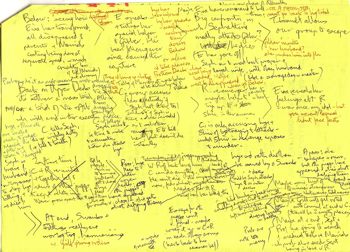1. Preparation
| |
(vii) TO PLAN OR NOT TO PLAN |
Some authors are planners, others fly by the seat of their pants. The more I talk to other professional writers, the more I come to the conclusion that there’s no best way.
I know some authors who jump straight in and others who never start until they have a detailed chapter-by-chapter outline; some who zoom through a first draft at top speed, then revise; others who think out a climax, then work carefully backwards. It’s amazing how such different methods can all end up producing great results. What matters, as with starting-points, is that the method doesn’t leave a mark on the finished novel. The proof of the pudding etc …
Me, I’m on the planning side. I think in waves and stages rather than chapters, but I enjoy thinking about a novel in advance. Writing fantasy, I also spend a long time—often years—designing a backdrop world before I start telling the story. I guess that’s a tendency for all fantasy writers, as thinking out a climax first would be a tendency for detective mystery writers. Still, fantasy writers can also jump in, then pause to develop their worlds along the way. I had to take months off in the middle of writing Ferren and the Angel to create the history of Ferren’s world.
Nevertheless … I’m going to backtrack here. Although you can be a planner or a non-planner, I think there’s one kind of planning that’s asking for trouble, and ditto with one kind of non-planning.
With planning, it’s the fixed plan. That is, the plan you’re determined to stick with all the way through, no matter what. Let’s face it, you could spend forever planning a novel and it would still be too big to get completely on top of. Your story and characters will always shift and develop new angles as you write, so you need to stay flexible. Learn from your novel, don’t just order it around.
With non-planning, the danger is in not looking ahead at all. It sounds good to talk of letting a story take care of itself, but unless you do some selecting and shaping, events are liable to peter away as they do in real life. Entropy rules! Fizzle-out endings are okay for semi-autobiographical fiction and literary fiction, but genre fiction needs big satisfying endings.
An author may not write notes or consciously plan, but I believe that every genre author has at least an instinct for heading somewhere interesting, where events will start building up on themselves. If the author isn’t bothered about what happens ahead, why should the reader be?
Most of all, you can’t pull a big ending out of the hat at the last minute. I think of a novel like a great unwieldy monster thundering across the landscape, and the author sits on its back with just a couple of strings for reins. No way can you slew that monster round suddenly in a desired direction. If you want a big climactic ending, you need to start guiding towards it, with tiny amounts of pressure, from very early on.
SOME EARLY PLANNING NOTES FOR LIBERATOR (sequel to Worldshaker)

That's my scrappy handwriting - I should've been a doctor … |





